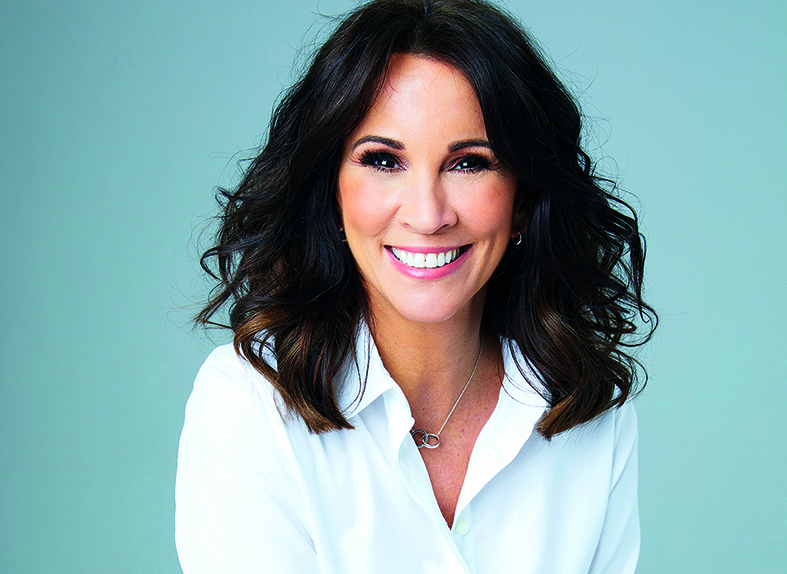Menopause affected the Loose Women star, 50, who shared her menopause survival tips and opens up about how a hysterectomy in September 2016 transformed her mind, body and sex life.
Words: Gemma Calvert
Within 24 hours of announcing on Loose Women that I was having a hysterectomy, 10,000 women contacted the show. I couldn’t answer them all, so decided to write a book, which my agent at the time strongly advised against, saying: ‘It’s career suicide to be associated with older women, being sweaty and people thinking you’re going mad’.
Minds like his needed changing so I wrote a guidebook for women, called Confessions of a Menopausal Woman, which talked about the menopause as natural and normal. People still stop me in the street offering thanks, including men who say, ‘You’ve given me back my wife’!
Every menopausal woman has a different experience. Some barely notice it, for others it’s a bump in the road and they find help, perhaps through hormone replacement therapy or a change in diet. For some, it ruins their life.
Having a hysterectomy
If you’ve been recommended a hysterectomy, ask your surgeon whether your ovaries need to be removed as well as the womb and cervix. When hormone-producing ovaries are taken out, it’s like a tap is switched off.
I had endometriosis and cysts on my ovaries so it all needed to come out and I wrongly thought that because I was on HRT, I’d be fine. I wasn’t prepared for the many huge changes.
My body is years ahead of itself: my metabolism has slowed down, my waist has disappeared, my skin feels thinner and more sensitive and I have weak hair.
Perimenopausal from age 37
I take a Solgar skin and hair supplement and have also noticed some regrowth since using Plantur 39 shampoo, which is designed for menopausal women. I was perimenopausal from 37. I developed night sweats that soaked through pillows and duvets. It was soon after I got pregnant, which was a surprise because I needed fertility treatment for my first child.
I was 42 when the menopause started coming back again and as well as sweats I suffered huge mood changes. I’m normally quite a steady-Eddie but I was hot under the collar over everything. I was in the middle of a divorce so blamed a lot of it on that but my mum went through an early menopause at 40 and had the same symptoms so it was on my radar.
Taking HRT to alleviate menopause symptoms
After six months, my doctor advised me to go on HRT and that’s hugely helped. I was really in tune with myself but so many women don’t know what’s happening and so battle through alone. It makes me so sad. I apply a plant-based oestrogen gel to my skin every day. Oestrogen helps pump collagen between your bones, which is why [a drop in it leads to] bones creaking and aching.
You also have oestrogen in your brain so reduced levels mean the brain receptors don’t work as quickly, hence brain fog. It’s a joke that middle-aged women can’t park but there’s a biological reason for it! I also have two pumps a month of testosterone gel to increase energy levels, lean muscle mass development and sex drive and every night I take a progesterone tablet, which my GP recommends because of the painful endometriosis I used to suffer.
How menopause affected my sex life
Post-menopausal sex is as good as it can be. Twice a week I use Vagifem® pessaries, which contain oestrogen, to help with the elasticity of the vagina. When you go through the menopause, the vaginal wall becomes brittle and thin, which is excruciatingly painful during sex. Trust me, you can’t close your eyes, think of England and get through it! There is no getting through it.
My husband [businessman Nick Feeney, 47] and I talk very openly about everything so I could say “actually, that doesn’t feel right” or “can we put a hold on everything for a little while?”. Now everything is fine and back to normal. Well, back to our normal. The most difficult thing was [thinking sex has] never been the same and there’s a sadness [to that]. There’s always been some kind of pain since.
Foods to help reduce menopause symptoms
Foods can boost oestrogen levels. Lentils and oily fish including salmon are good, as are green, leafy vegetables. I spray a multi vitamin oral spray under my tongue morning and night and take a vitamin D spray. Research shows that most of anything you swallow is gobbled up by stomach acid, but a spray under the tongue is absorbed into the blood stream, so you absorb more.
Menopause affects your mood
It’s okay to say “I’m having a blue day today”. I still get low moods but I understand that we’re not made to feel great all the time. I meditate at least four times a week for 15-20 minutes or, if I’m feeling a bit overwhelmed, ask myself, ‘What can I see?’ and list five things. Then I ask, ‘What can you hear?’ and, ‘What can you feel?’.
Five minutes go by and I won’t have thought about whatever was worrying me. It’s a good little tip for feeling calmer.
The key to coping with the menopause is keeping a sense of humour. If you end up suffering terribly, it can be hard but remember that it will pass and life won’t be quite the same as before but that’s okay. The menopause is just a transition and totally normal.
Andrea is the author of Confessions of a Menopausal Woman (£12.99, Hay House) and founder of lifestyle website thisgirlisonfire.com
Read more about menopause and how to beat hot flushes with essential oils, here








